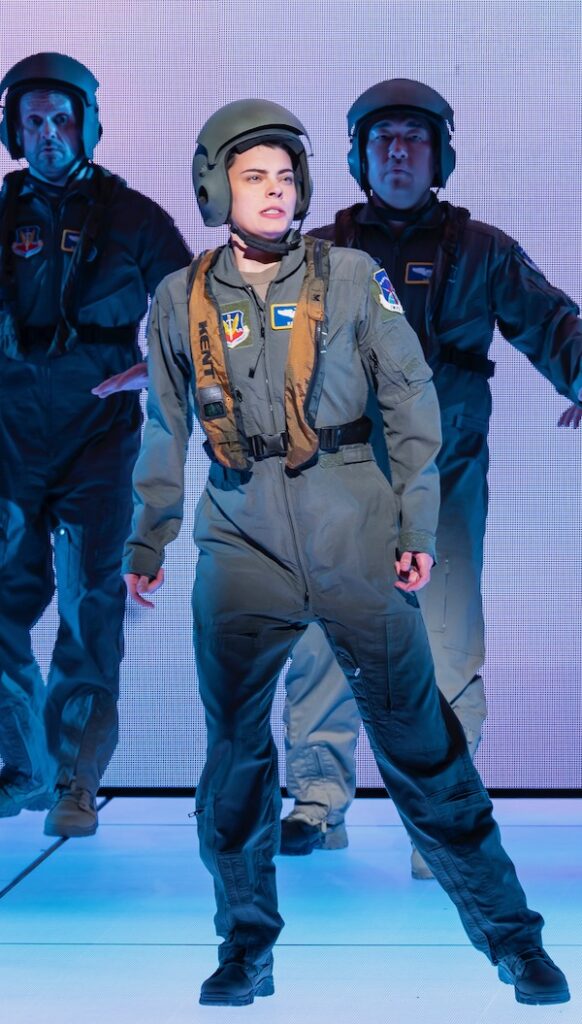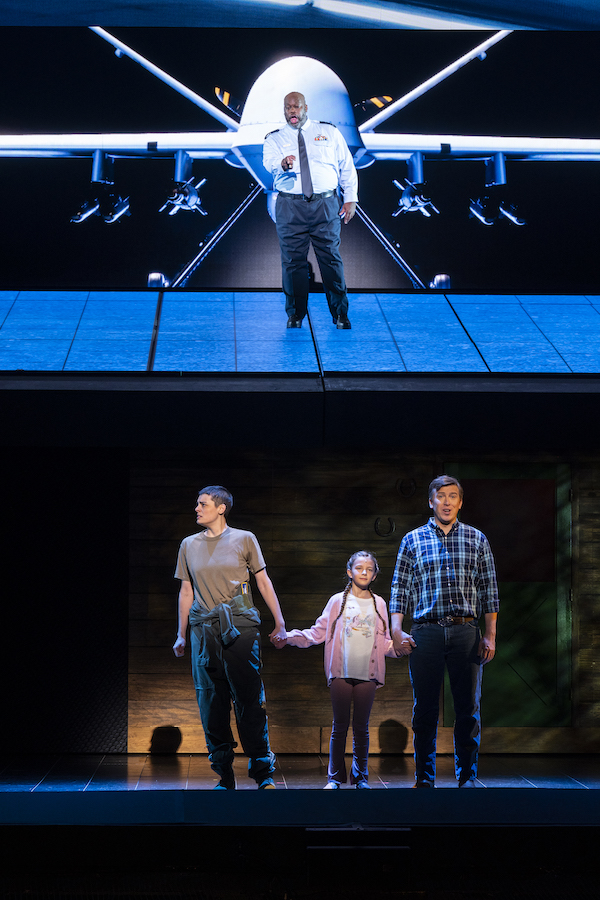
Emily D’Angelo stars in Jeanne Tesori’s Grounded, presented in its world premiere by Washington National Opera Saturday night. Photo: Scott Suchman
Washington National Opera finally opened its season Saturday night, with the world premiere of Grounded, a new opera by Jeanine Tesori. The city’s once-leading opera company now receives only two three-week stands in the Kennedy Center Opera House, crowded out by productions of musicals. Tesori, herself a lauded composer of musicals, has had two operas mounted here in the last decade: last season’s Blue and the insipid holiday opera The Lion, the Unicorn, and Me.
George Brant adapted the libretto from his acclaimed one-woman play, premiered in 2013 and partly inspired by a photograph of a pregnant F-16 pilot. One such pilot, named Jess in the opera version, gives up flying when she finds herself pregnant. She returns to combat after an eight-year absence, this time as a drone pilot in the Air Force’s Reaper program. The end of the opera explores the mental trauma Jess experiences, because she conflates her own family life with that of a high-value target she pursues remotely in Iraq.
Controversy erupted last spring over the sponsorship of this opera by General Dynamics, a major American military contractor that sponsors the entire WNO season. WNO released a statement that none of its sponsors ever had “any involvement in the creation of Grounded or in the contents of its libretto.”
The glorification of American military air power came across loud and clear in the high-tech production directed by Michael Mayer. (Some members of the audience even chanted “USA! USA! USA!” at the curtain call.) An LED-screen ceiling, wall, and floor created an upper space over the stage, filled with immersive video of the sky, the American and Iraqi desert, and the high-tech gadgetry of the Reaper controls (projections designed by Kaitlyn Pietras and Jason H. Thompson). The lower part of Mimi Lien’s set served as the other interiors, revealed or hidden by sliding walls.
Sadly, Tesori’s music is disappointingly thin and lackluster. Military cliches abound, like the opening drum rolls and trumpet fanfares, and her go-to instrumentation for emotional moments was piano and high strings, with some predictable shimmers of bar chimes. Unusual sounds were limited to percussion, including what sounded like shell shakers, used to excess, and a wind machine at one point. A trumpet solo came from the back of the auditorium in Act II.
Both acts dragged, making for what felt like a long night in the theater, but was only 2-1/2 hours. If you think tracking remote targets for hours as a drone pilot is boring, try watching an opera about it. Even worse was an aria about making a PowerPoint slide presentation.
Mezzo-soprano Emily D’Angelo, who made a spectacular virtual debut on the Vocal Arts DC series two years ago, rewarded the opera’s central focus on Jess. The many powerful qualities of her radiant voice incarnated the various sides of the character: the ace’s gutsy swagger alongside maternal warmth and conflicted regret as her psychological state deteriorated.
Brant had to fill out the other characters from his original play, in which they appeared only within the protagonist’s thoughts. Tenor Joseph Dennis brought a wholesome earnestness to Jess’s husband, Eric. The couple meet while Jess is on leave, during a fun choral scene in a Wyoming honky-tonk imbued with the sounds of country music. Dennis’s most impressive high note came at a comic moment in this scene, which brought him to Jess’s attention.

Photo: Scott Suchman
Bass Morris Robinson made a stentorian Commander, a gruff but ultimately caring senior presence in the Air Force chain of command over Jess, spewing four-letter words for authenticity. When Jess asks to return to flying, he convinces her to move to Las Vegas to fly in the Reaper program, mainly because it will keep her close to her husband and daughter: “War with all the benefits of home,” as he puts it.
Young singers fill out the cast, including former WNO Cafritz Young Artist Frederick Ballentine, as the slick, fast-talking Trainer for the Reaper program. Baritone Kyle Miller garnered many laughs as the Sensor, the hoodie-sporting, soda-quaffing former video-game whiz who serves as Jess’s Reaper co-pilot. Other voices of the chain of command are piped in over loudspeakers, as if heard by Jess on her headset.
Soprano Teresa Perrotta, who sang the role of Mimi in the Cafritz Young Artists performance of La Bohème last season, soared as Also Jess, the double of the main character who appears at the end of Act I as her personality begins to fracture. Willa Cook, a member of the Children’s Chorus of Washington, made an adorable debut as Sam, Jess’s tweenage daughter, aided by occasionally unreliable amplification.
The greatest musical interest of Tesori’s often bland score came from the male chorus, ably prepared by Steven Gathman. They appeared first as the F-16 squadron, full of Top Gun bravado, morphing into a ghostly choir of soldiers, as their exultant, jingoistic cries of “Boom goes Basra! Boom goes Baghdad!” soften into ethereal, dissonant echoes of “Boom.” Their musical-theater turn as an aw-shucks chorus of mall rats in the opening of Act II should have found its way to the cutting-room floor (show choir choreography by David Neumann).
Daniela Candillari, principal conductor of Opera Theatre of St. Louis, made a competent debut at the podium of the Kennedy Center Opera House Orchestra. The only coordination issue of the evening was with the chorus, often following her from the higher part of the set, via an enormous screen glowing at the back of the house.
Grounded runs through November 13. kennedy-center.org




